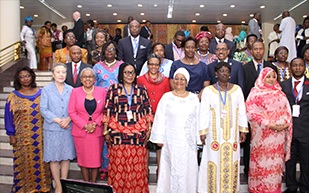They made the call at the First ladies session at the ongoing UN General Assembly High-Level Meeting on Ending AIDS, taking place in New York.
The event was organised by OAFLA in collaboration with UNAIDS, Gavi, the Vaccine Alliance, and the U.S. President’s Emergency Plan for AIDS Relief.
They said adolescent girls must assume leadership roles to ensure the development of programmes and policies that are appropriate to their needs and fully respect their sexual and reproductive health and rights.
They urged providers of health-care services to integrate service delivery and programme design to support the ability of adolescent girls and young women to make informed life choices and keep themselves healthy, including protecting themselves from HIV infection.
First Lady of Ghana, Lordina Mahama, said: “the organisation strongly believes that in moving towards the Fast Track Targets we must ensure that no young girl or boy is left behind.
“We must address the needs of young people, especially young girls, ending gender inequality and other factors that increase their vulnerability to HIV”, she said.
First Lady of Panama, Lorena de Varela, said that information allowed young people to make choices.
“I encourage us all to listen to best practice programmes so we can be catalysts and advocates for policies that really work for young women”, she said.
First Lady of Benin, Mrs Claudine Talon, said in spite of the progress achieved, States must redouble their efforts in ending the AIDS scourge.
“We must offer in simple way information in relation to HIV infection’’, she said.
First lady of Burkina Faso, Mrs Adjoavi Kabore, said when the world is entering a new phase in the AIDS response, UN member states need to pay particular attention to women, young girls and infants.
“We need new strategies to stop violence against women and girls, reduce school drop-outs and end forced early marriage”, she said.
First lady of the Congo, Antoinette Sassou-Nguesso, said: “we have to offer communities a package of integrated approaches that include immunisation, sexual and reproductive health and rights and education.
“We need to redouble our efforts to offer antiretroviral therapy to protect the future of our countries because our young people are the future’’, she said.
First lady of Niger, Mrs Aissata Mahamadou, said “it is extremely important to meet the reproductive health needs of young Africans in order to end the HIV epidemic within the framework of the Sustainable Development Goals.
Others who spoke were first ladies of Côte d’Ivoire, Dominique Ouattara, Haiti, Mrs Ginette Privert and Namibia, Mrs Monica Geingos.
NAN reports that the Joint United Nations Programme on HIV and AIDS (UNAIDS), says globally, AIDS-related illnesses remain the leading cause of death among women of reproductive age.
In 2015, UNAIDS said there were estimated 180, 000–340, 000 new HIV infections worldwide among adolescents, aged 15 to 19 years, with adolescent girls accounting for 65% of new HIV infections among this age group.
The UN agency said that gender-based violence, gender inequity, harmful gender norms, stigma and discrimination often prevented women and girls from knowing their HIV status and accessing appropriate HIV prevention and treatment.














No comments :
Post a Comment